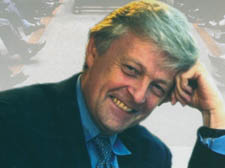|
|
 |
| |

Frank Johnson |
Welcome to Frank’s house of fun and games
Illtyd Harrington enjoys an anthology of the work of the sharpest and funniest observer of Parliament of our times
Best Seat in the House.
By Frank Johnson. JR Books, £18.99
FRANK Johnson died in 2006 aged 63. Born into a traditional working-class family in Stoke Newington, he completed his education at a Shoreditch secondary school leaving with one O-level.
The Johnson parents were marginally to the left of Alf Garnett. He progressed to being one of the supernumerary three parliamentary reporters for the Sun. Such was the puritan streak in his household that he got up early in the morning to remove page three of his paper before his mother caught a glimpse of the heavy-breasted young females.
Captivated by the high drama and low comedy of the Commons, his chance came in 1972 when against the odds he became the Parliamentary sketch writer for the Tory Daily Telegraph. Later he joined The Times and went on from there to hold the editorship of the prestigious weekly The Spectator.
But Parliament proved too strong a pull, he took his seat in the press gallery for The Times, where he completed 30 years of observation and characterisation of the most adroit kind. He saw “the pompous fraud, the desperately inadequate”, and his rapier humour lit up many a dreary day for his readers. His gift of irony was envied by his contemporaries.
He fleshed out his characters. Boris Johnson, then the MP for Henley, was “the Tommy Cooper of the Tory benches”; Enoch Powell had “a death mask face, a black suit and creeping Black Country vowels”; the Dracula lookalike Norman Tebbitt was the “Chingford strangler”, who lived somewhere similar to Highgate cemetery, “emerging from a vault from a creaky door into the dark”; Roy Hattersley is a politician’s politician, one for the connoisseur, not for the masses; and he christened Dennis Skinner as the Beast of Bolsover and a publicity-seeker. But he respected Skinner’s care for his constituents.
Looking at the crowded peers gallery he wrote: “amongst their lordships were the aged, the embittered the patriotic and the half crazed.”
He was besotted with Thatcher who he said had “iron dimples”.
President Ronald Reagan on a visit to House of Parliament won Johnson’s maximum approval-rating: “Reagan turned out to be a genial man, a walking tribute to the avoidance of jogging, health food and psychoanalysis.” Good pub philosophising.
As far back as the 19th century, Parliament was described as the best gentlemen’s club in Europe. Johnson enjoyed it, as he did eating at exclusive parties where the new conservatism was being hammered out – the conception of the gentle, caring philosophy, no more nasty party.
Shortly before his death he appeared to be worshipping at the altar of the high priest of the free market and monetarism.
Milton Freidman was essential bedside reading for Thatcher and her loyal friends and the murderous General Pinochet.
The boy from Stoke Newington, armed with his one pass GCE, was seduced by the intellectual pretension of the new Tories.
All of that I can forgive and this highly readable account of Parliament, edited by Johnson’s wife, Virginia, cascades with laughter and is never dull.
He was an unforgettable journalist, a worthy successor to Dickens and William Cobbett, coaxing us to take notice of the palace of politics, before it becomes the chamber of horrors.
|
 |
|
|
 |
 |
|
 |
|


